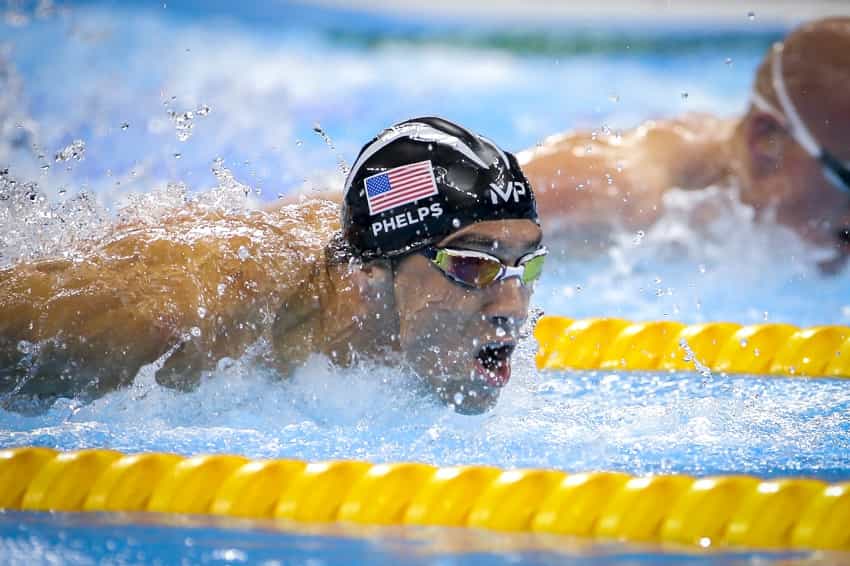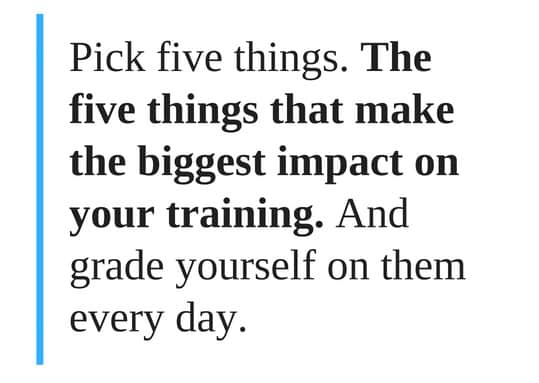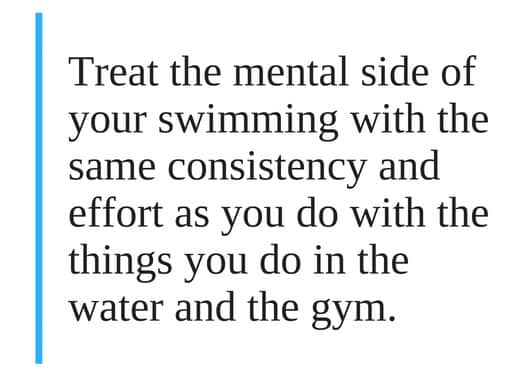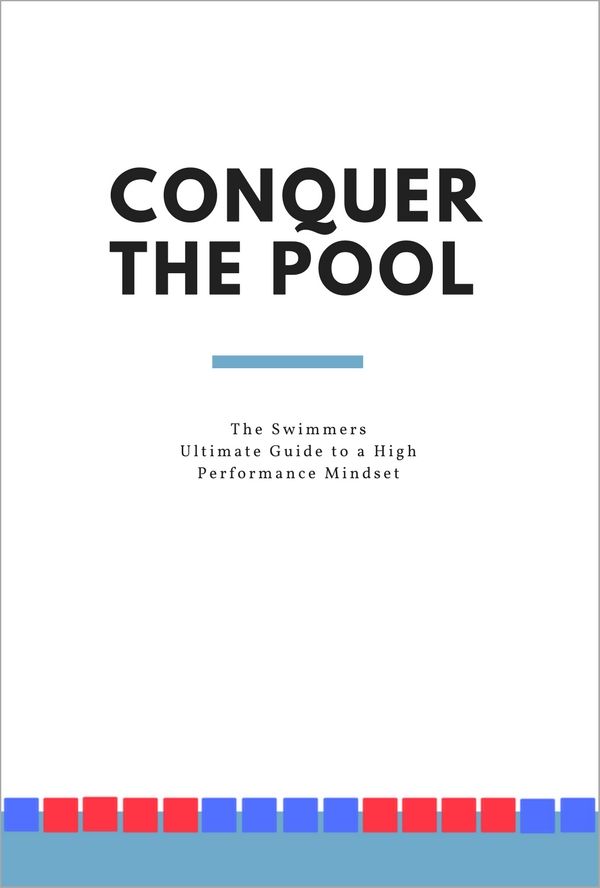Looking to get started with mental training but don’t know where to start? Here’s a 3-point plan for getting seriously mentally tough this year.
Are you satisfied with your performance in training?
How about competition?
Are you getting the most out of yourself each time in the water?
If you are like most competitive swimmers, the answer is likely not-so-much.
The reasons you aren’t maxing out your potential can vary. You aren’t consistent enough in practice. You get overwhelmed in competition. You get caught up caring too much what others think. And so on.
All these problems invariably lead back to the same place: that little area between your ears and under your swim cap. When it is all said and done, it’s your mindset that dictates how things go for you in the water.
And even though most of us understand the power of having a better mindset in the water, we hesitate on pulling the trigger on spending the energy and effort to improve:
- It can seem confusing. With so much material out there it can feel overwhelming. Where to start?
- Not enough time. You’re already in the water nine million hours a week, so ain’t no one got time to spend more time training.
- Mental training means something is wrong or broken with you. You shy away from it because you are under the impression it means you are weak.
- You only want to learn when something goes wrong. This is typical (and totally understandable). Having a high-performance mindset shouldn’t just be a priority when things aren’t going your way.
- It’s only for elite swimmers. Spending time on your brain is reserved for the best of the best.
Instead of trying to learn mental training inside and out, focus on the handful of things that are going to have the highest amount of impact on you and your swimming.
Here are three of my favorite ways to unleash a high-performance mindset on your swimming this season.
1.Your top five things to work on in practice.
We all have big goals and dreams when it comes to the pool. The big and nasty goal is the easy and fun part. It’s the next step that trips up a lot of swimmers—putting a sustainable plan in place to make it happen.
Sit down and think of the five biggest things you want to work on in training. Not ten, not two, not a hundred… Just five.
Your little list gives you something to focus on each day during your swim workouts. It gives you specific things that can control to throw all your effort at. This controllable focus is intoxicatingly motivating and allows you to stay focused on maximizing your own performance.
During the times motivation crater on us it’s usually because our focus has begun to wander.
We start thinking too much about the results. We start focusing on what the competition is up to. We start basing our effort on how we feel, how our day is going, or any other myriad of factors that aren’t always in our control.
This small and simple list gives you a personal blueprint or process for not only faster swimming, but confidence and sense of control.
Don’t sweat that it doesn’t feel like you are doing enough. Once you start crushing the five biggies in your training, everything else will fall into place.
2. Visualize daily.
Lots of swimmers use visualization in some way to help blast away the competition on race day.
Michael Phelps was a voracious goal setter, but he was also big into visualization. He performed his nightly visualizations when he got into bed, imagining the perfect race and the worst-case scenarios so that he was prepared when things eventually did go wrong on the big stage.
Garrett Weber-Gale used visualization to help him be mentally prepared for the moments in races where we are in peak agony and pain—having experienced it in his mind countless times he was ready for it when it happened in real life.
Using it for competition is one powerful way to use visualization, but another sneakier way to incorporate it into your swimming is to use it mid-workout before those high-energy efforts.
Here’s an example.
Let’s say coach has prescribed you a set of fast 50s as close to 100 race pace as possible. In those final ten seconds before you push off, while the clock hand sweeps towards the top, mentally rehearse how you want to feel in the water and the technique you want to have.
Imagine yourself sailing across the surface of the water. A crisp catch. A dolphin kick so strong that you could kick through the tiles on the pool floor.
A study with track athletes found that this quick little visualization trick improved performance far better than traditional psych-up techniques. More speed and power—just from a quick bout of imagery. That’s basically free speed in the water.
A little bonus is that with the daily practice your competition visualizations will become richer and more realistic.
3. Build a list of performance cues for your, err, performance.
For all the magic and wonder (and frustration!) that our brain is capable of, it is remarkably simple when it comes to focusing. While we tend to believe that we can pay attention to everything at once, our focus is actually quite narrow and sharp.
You likely know this, even if only intuitively—after all, when we focus or obsess on something it can seem like there is nothing else in the world.
While we can think of all the times this has worked to our disadvantage (focusing deeply on what others think, for example), we can also use this superpower for good.
How? With performance cues.
They are super simple. So simple that it seems hilarious that they could work. But they do.
Performance cues help keep your mind from wandering, keep you focused on the things that drive your performance, and are things you can control and decide on ahead of time. Performance cues work by keeping your focus where you want it.
There are a few different scenarios where performance cues come in super handy:
At specific points in your race. One of the things I always ask of the athletes I work with is to write 3-4 performance cues for their race. “Easy speed” for their opening 25. “Bring it home!” for the last 25. And so on. Keep it simple.
Use them behind the blocks to keep yourself focused. Simple cues like “loosey goosey” can help you stop from overthinking in those quiet moments before you race.
During hard sets in practice. One of my all-time favorite cues is dropping a “Hulk Smash!” when 15m out from the wall during high-intensity efforts. Pick a couple performance cues to use when you hit peak agony in training to help you power through.
Performance cues help you automate faster swimming, keep calm under pressure, and might even make you a little bit taller. Not bad.
The Next Step
Mental training has a bit of a bad rep in the sense that it tends to imply something is wrong with you. Or that it’s a last-minute fix or a band-aid for your performances.
But you should view working your mindset and mental training in the same context as your physical preparation: you are simply optimizing your whole body for peak performance.
Think of mental training as lifting weights and doing lactate threshold sets for your brain.
This means starting small, progressing, evaluating, and staying consistent with it over the season. Begin with these three “exercises” and let me know how it goes.
 Want more help with mental training?
Want more help with mental training?
Whether you are tired of choking on race day, want to finally conquer your mindset so that you can give your PB’s the beating they deserve, or you want to develop a killer game plan for your mindset, Conquer the Pool is your ticket to faster swimming.
Used and trusted by some of the top clubs and swimmers on the planet and written the feedback of 200+ head coaches, Olympians, former world record holders and NCAA champions.




 Want more help with mental training?
Want more help with mental training?











